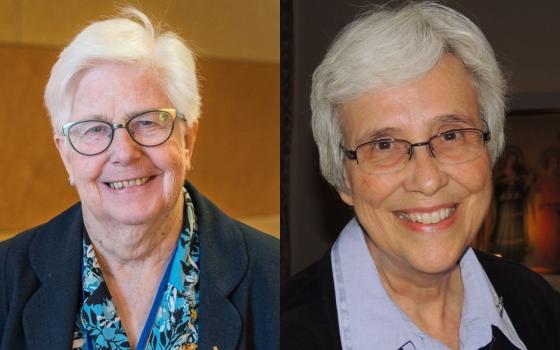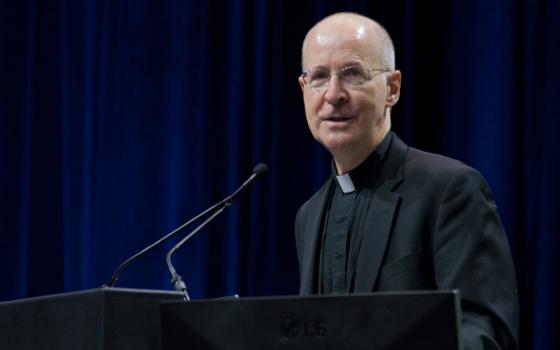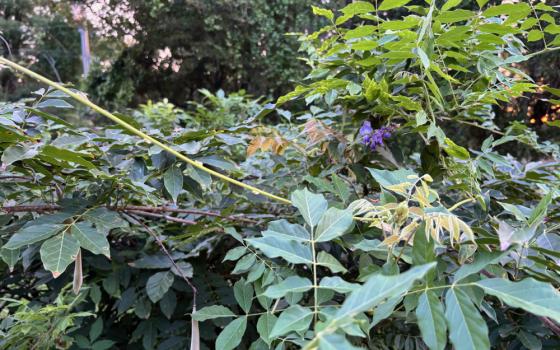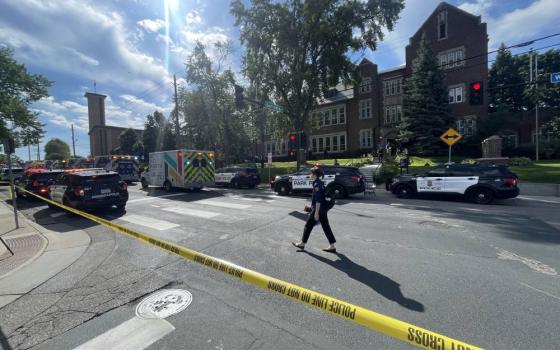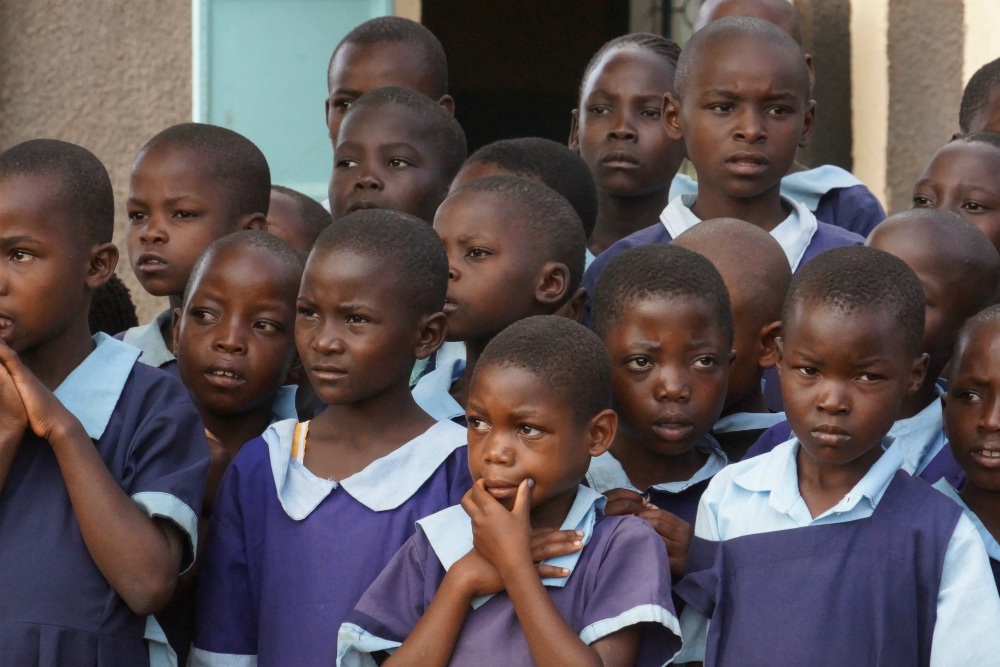
Kenyan schoolchildren listen to their teacher in June 2019 outside their classroom in Bungoma in western Kenya. According to UNESCO, the education of 1.54 billion pupils in 185 countries has been curtailed during the pandemic. (Doreen Ajiambo)
Sarah, who is four months pregnant, ponders her fate as she sits in front of her house – watching her peers play outside their homestead in this settlement located 39 miles southeast of the capital, Nairobi. With her kanga wrapper tied around her bust and another colorful one on her waist, Sarah says she will not be returning to school even when coronavirus restrictions are eased.
"I will not continue with studies when schools reopen because of my appearance," explains the 12-year-old girl with a very small stature, who asked that Global Sisters Report not use her real name. "I'm really embarrassed and everyone is avoiding me. No one wants to talk or play with me."
Sarah has not been in school since mid-March when all the schools in the East African nation were closed as part of the government's response to COVID-19. During the lockdown, the Grade 7 pupil became pregnant by a 28-year-old motorcycle taxi operator.
The girl told GSR that her mother instructed her to start selling roasted peanuts at a nearby trading center to supplement the family's daily income as she waited for her school to reopen. That's when she met the man who got her pregnant, she said. He denied responsibility and she hasn't seen him since.
"The man used to buy several packets of roasted peanuts and he could give me extra money to buy sanitary towels, and the only price I was to pay was to give away sexual favors," she said, trying to keep her composure. "I honestly never thought I could be pregnant at this age."
She wished the government wouldn't have closed schools. Last week, it announced that schools would reopen sometime in October.
"COVID-19 has destroyed my life completely," said Sarah as she broke down but bravely tried to suppress her emotions. "If it were not for the disease, I would have been busy in school and not pregnant."
However, Sarah is not alone. She is among 3,964 girls who have become pregnant in Machakos County during the lockdown. July government statistics also show that about 152,820 teens in all of Kenya's 47 counties became pregnant in the first three months of the lockdown that began in March, a 40% increase over the same period in 2019.
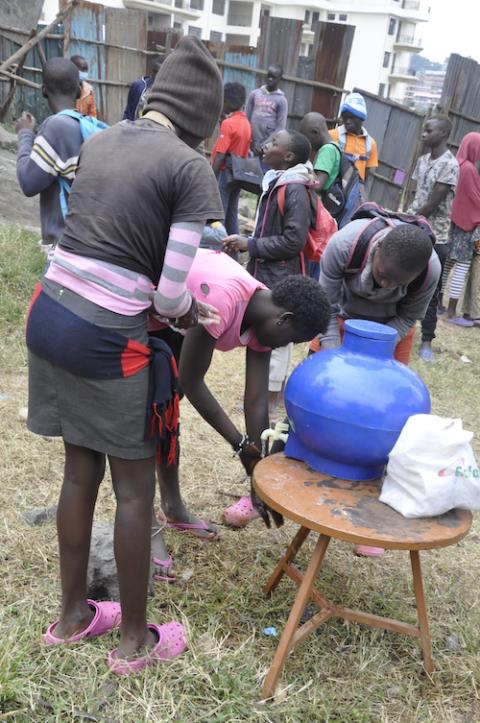
A group of teenage girls wash their hands at Amani Rehab and Primary School in Nairobi. Sisters recognize that the girls are especially vulnerable during the COVID-19 pandemic and have come up with interventions to ensure they are safe. (Lourine Oluoch)
UNESCO warns that the pandemic is likely to have a devastating effect on learning in areas where education is already a struggle, specifically girls' education.
The U.N. agency reports that out of the total population of learners enrolled in education globally, more than 89% are out of school because of COVID-19 closures. This represents 1.54 billion children and youth enrolled in school or university, including almost 743 million girls. More than 111 million of these girls are living in the world's least developed countries, where getting an education is already not a priority.
In Kenya, at least 10.5 million pupils in primary schools and 2.9 million in secondary schools were sent home following the school closures due to the outbreak of coronavirus.
Access to sanitary products remains a critical challenge for many young girls due to the pandemic, according to research by Menstrual Hygiene Day, a global advocacy platform for nonprofit organizations and government agencies to promote menstrual health. The study also shows that 65% of women and girls in Kenya are unable to afford sanitary pads.
Some men are using the lockdown to take advantage of schoolgirls by luring them into sex in exchange for money to meet their basic needs like sanitary pads and underwear. A majority of girls here have had no sex education in school and don't know how to prevent pregnancy, factors that contribute to a high rate of teenage pregnancies.
Religious sisters are among various stakeholders trying to find a lasting solution to the rising cases of teenage pregnancies amid the pandemic lockdown.
Sr. Veronica Kinyambu of the Assumption Sisters of Nairobi has created a WhatsApp group geared toward reducing teenage pregnancies in Machakos County to complement the government's work to promote girls' education in the country.
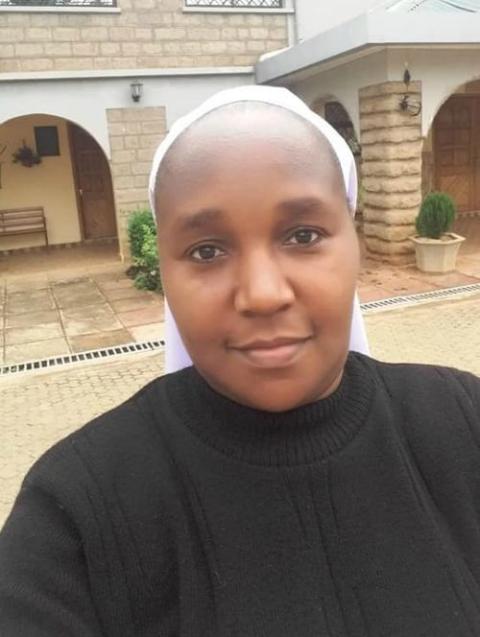
Sr. Veronica Kinyambu of the Assumption Sisters of Nairobi has created a WhatsApp group geared toward reducing teenage pregnancies in Machakos, Kenya. (Provided photo)
Kinyambu said members in the social media group are advised to use the platform to report when and where cases of early pregnancy, defilement and the molestation of minors have occurred in the county. Later, the participant may lead rescuers, including sisters, to the scene to assist the girl and her family.
"I am really worried about these girls getting pregnant since they are idle at home," said Kinyambu, who is also the school administrator of St. Mary's Girls' Primary School in Machakos. "Their future is so uncertain. Most of them may not even be able to come back to school."
Through a WhatsApp group, sisters monitor the progress of the girls and sometimes visit and encourage them to abstain from premarital sex to avoid early pregnancies and stay in school. They also distribute sanitary pads and other essentials donated to the girls.
"We're working hard to ensure there are no more reported cases of early pregnancies during the pandemic. We've advised parents on how to monitor the movement of their girls and report to us," she said.
Sr. Ann Grace Njau of the Missionary Sisters of the Precious Blood is also working to prevent early pregnancies in the slums of Nairobi amid the COVID-19 pandemic and lockdown. She is using economic incentives and livelihood programs to keep girls interested in school and to delay early pregnancy.
The nuns set up distribution tents outside Amani Rehab and Primary School, where the children normally go early in the morning to have breakfast and lunch before returning home in the evening. They also distribute sanitary pads and other essentials to the girls so they do not have to rely on predatory influences.
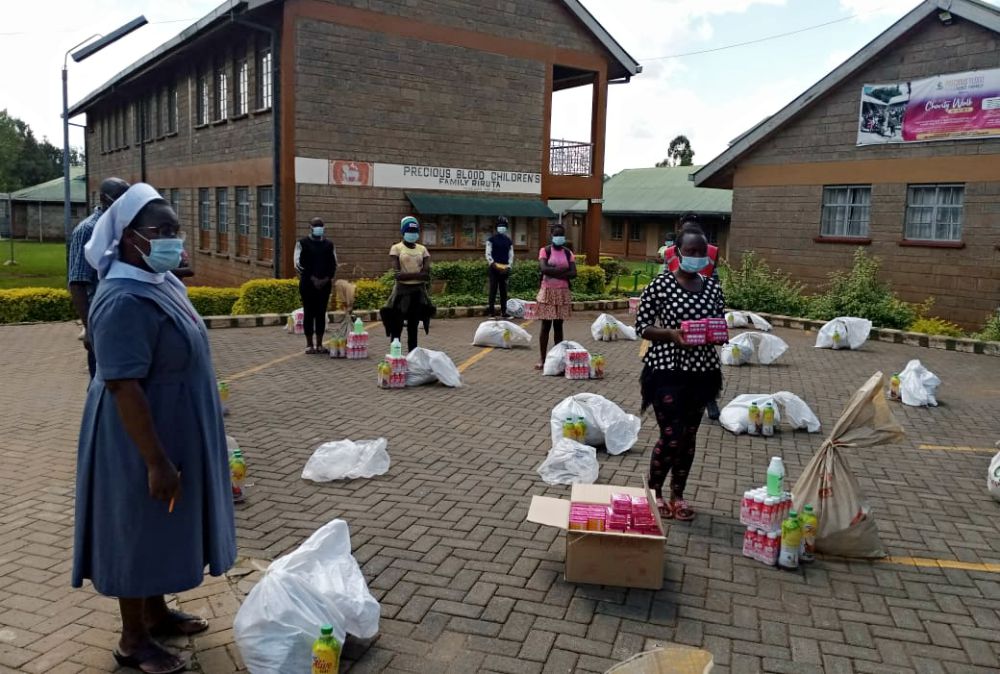
Sr. Ann Grace Njau of the Missionary Sisters of the Precious Blood distributes sanitary pads and other essentials to girls from Amani Rehab and Primary School in Nairobi. (Provided photo)
"We are giving these children everything so that they don't go looking for things like food and pads and get exposed to sex predators," said Njau, who is also the administrator of Amani Rehab and Primary School. "We have seminars for girls every month where we teach them how to cope with life during this COVID-19 period. We talk to them on the dangers of getting into early sexual relationships and how to avoid peer pressure because many of them just get into relationships because their friends are also in relationships. We encourage them to focus on their future, because the virus will one day end, and life will continue."
Sisters have blamed motorcycle taxi operators in the area for enticing schoolgirls with money and free rides for sex, contributing to the high volume of cases of teenage pregnancies and school dropouts. Njau said that girls also cite family poverty and the lack of parental support as issues that push them into early sexual encounters.
"I don't allow motorcycle taxi operators at our school gate these days. We thought we were supporting them to earn their living but I realized they were the very people targeting our girls and making them pregnant," she said.
Fourteen-year-old Mary, who is one of the beneficiaries of the sister's program, said the abrupt school closings were a double tragedy for her. She not only lost on education, but also on free access to sanitary pads provided in schools under a government project to promote menstrual health and hygiene.
"It's difficult for us since we are three girls in our family," she said. "Right now, we can't access pads until schools reopen. But we thank those nuns who are helping us with pads, though they are not enough. Their aid has really helped us to avoid motorcycle taxi drivers who take advantage of us."
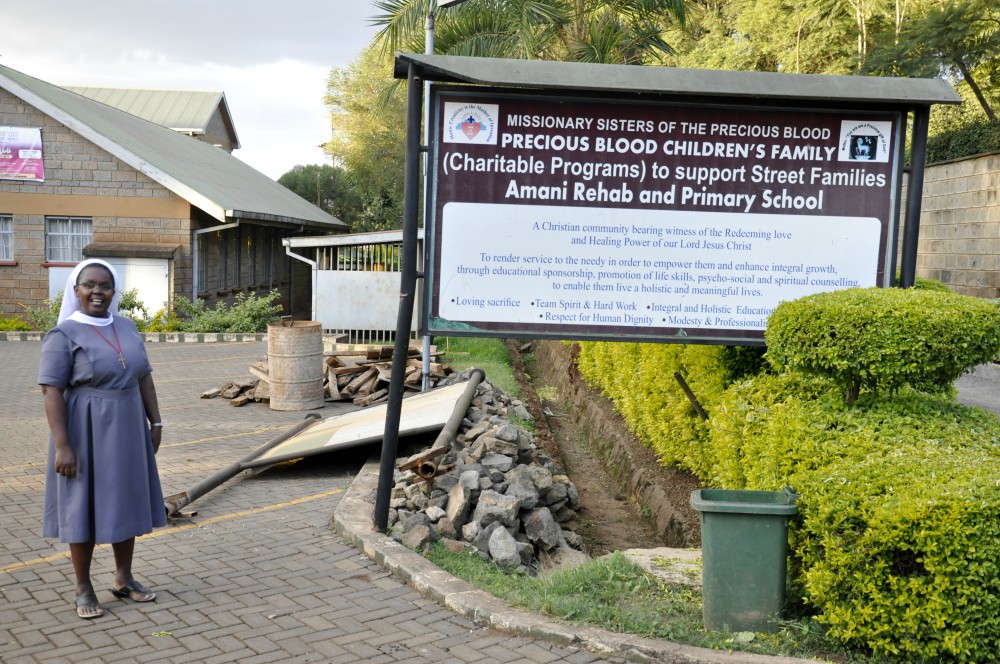
Sr. Ann Grace Njau, a member of the Missionary Sisters of the Precious Blood, is the director of Amani Rehab and Primary School. The school started as a feeding program for street children in Nairobi's informal settlements of Kawangware and Riruta, but today has more than 200 learners going through the normal Kenyan primary school curriculum. (Lourine Oluoch)
Still, some girls are risking their lives through unsafe abortions so that they can go back to school when the virus is controlled.
In June, officials cleaning up the badly polluted Nairobi River that flows through Korogocho, one of the city's biggest slums, made a grim discovery. They retrieved two bodies of infants, one wrapped in a polythene bag, from the river. Since the cleanup began in 2019, the bodies of five adults and 16 infants have been found, according to The Standard, a newspaper in Kenya.
Jane, 15, said her fetus was among those disposed in the river. She tearfully narrated the near-death experience she had going to an abortionist to terminate her 10-week pregnancy so that she could go back to school.
GSR's policy is not to identify victims of sexual abuse or minors in harmful circumstances. The names of girls in this story are pseudonyms.
Jane had visited her relatives in the city after schools closed, and her 35-year-old married cousin coaxed her into having sex with him.
"I realized I was pregnant after missing my monthly periods," said the Grade 8 student. "I was afraid this could bring shame to the family and I would not go back to school."
Her cousin and friends advised her to seek a traditional birth attendant who charges $70 to perform a risky abortion. However, Jane had no money to pay for it, and she was forced to engage in sex in exchange for the services.
Abortion is illegal in Kenya unless the life of the woman is in danger.
"Since I had no money, I was forced to have sex with the doctor [a traditional birth attendant] for a week before he helped me procure an abortion," Jane said, as she complained of continuous dull aching pain in her lower abdomen following the operation. "I will still need to have sex with him again for seven days after I heal to settle my debt."
Ten other local women and girls who knew of his practices told GSR he normally asks for sex from girls who cannot raise the required amount of money.
Salome Muthama, who is the children's officer in Machakos County, said sexual offenses against girls have reached disturbing levels, threatening the future potential for women as leaders in the country. She vowed to take action against all perpetrators and urged the court not to delay handling such cases.
Advertisement
Kenya has a statutory rape law but cases are often stalled. Muthama has urged the judicial system to add legal counsel to her department to speed up the cases needing court representation.
She said time was ripe for sex education on reproductive health and rights so that adolescents can make better decisions and avoid sex until they are older. She also said families need to step up their roles in protecting their children, given that predators are often relatives.
"We should discuss matters of sex with our children so that they can be aware about changes in their bodies. If we fail in that responsibility, then our girls or boys will end up learning from social media and other unsuitable places," Muthama said.
Kinyambu warned against the introduction of sex education in schools and the legalization of abortion as a way of curbing underage pregnancies. She said that approach ignores the importance of context and morality, and the values and dignity of the person.
"We are not expecting the government to use the figures to push for the introduction of sex education in schools," she said, adding that parents have the responsibility to teach their children to abstain from sex until marriage.
Meanwhile, Sarah feels there is a need for parents and teachers to educate children on sexual matters to help prevent early pregnancies.
"I wouldn't wish any other girl to suffer like me because of lack of information," she said. "If I knew how to prevent pregnancy, I would be a free girl now and waiting to go back to school."
[Doreen Ajiambo is the Africa/Middle East correspondent for Global Sisters Report. Follow her on Twitter: @DoreenAjiambo. Lourine Oluoch, a freelance journalist based in Kenya, contributed to this story.]

